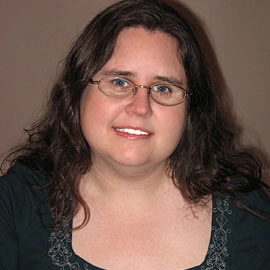| Faculty Profile: Kristen Kennedy, PhD
|
|
 Dr. Kristen Kennedy thinks that attending Hendrix College, a small, selective liberal arts school in Arkansas, was foundational to sparking her pursuit of knowledge as a lifeline activity and a profession. As a first-generation college student, Kennedy had the opportunity to become involved in research as an undergraduate research assistant, and she found she particularly enjoyed the experimental nature of psychology. Dr. Kristen Kennedy thinks that attending Hendrix College, a small, selective liberal arts school in Arkansas, was foundational to sparking her pursuit of knowledge as a lifeline activity and a profession. As a first-generation college student, Kennedy had the opportunity to become involved in research as an undergraduate research assistant, and she found she particularly enjoyed the experimental nature of psychology.
Considering a clinical career, she earned a master’s degree in clinical neuropsychology from Emporia State University in Kansas; however, at about this time, MRI technology became a more accessible tool for research, and being able to study how the brain works was compelling.
Kennedy also found aging to be an interesting subject, and chose the combination of the two for her focus in her PhD, which she earned at Wayne State University in Detroit under the mentorship of Dr. Naftali Raz.
“We are going to keep aging — more and more people are living longer. I wanted to study the difference between being old and cognitively intact, and being old and suddenly realizing you are declining.”
Kennedy was able to publish heavily as a graduate student, working with structural brain imaging, where different types of brain sequences are acquired in an MRI to measure different properties of brain structure. For example, the rate of blood flow to the brain slows down as you age, the white matter connections begin to degrade and this can correlate with memory scores and brain processing speed.
During a conference at the National Institute on Aging, Kennedy ran into Dr. Denise Park, now professor and director of research at the Center for Vital Longevity, who suggested Kennedy join her at UT Dallas to help set up a new lab and start a new aging study. Park and Kennedy discussed UTD as a place where they could really make a mark and help build something.
“Between what UT Southwestern already had established and what UT Dallas could build, this can turn into something amazing,” Kennedy said.
She joined UT Dallas to complete a postdoctoral fellowship with Park and helped build the Dallas Lifespan Brain Study, one of the nation’s largest projects examining cognitive aging from ages 20 to 90 and joined the Center for Vital Longevity when it was founded.
As a postdoc, Kennedy was named an American Psychological Society Rising Star and was awarded a K99/R00 grant from the National Institute on Aging, which provides two years of postdoctoral funding and three years of funding as an assistant professor. After going on the job market, Kennedy accepted a faculty position at UTD in 2012.
“The resources and facilities here are great, and researchers have good opportunities to use those resources and facilities,” Kennedy said.
The Kennedy Neuroscience of Aging and Cognition (KNAC) lab research is currently funded by the NIA and her research combines functional MRIs to analyze how brains behave as individuals perform specific tasks developed by the research team, with structural MRIs to measure changes to structural integrity with age to determine how brain structure impacts brain function as we age.
“We are trying to help the field disentangle the fuzzy borders between normal, healthy brain aging and pathological aging that could lead to neurodegenerative diseases, and how soon you can start telling the difference in those trajectories,” Kennedy said.
Kennedy is a co-area head for the cognition and neuroscience graduate program in the School of Behavioral and Brain Sciences. She teaches an undergraduate course in neuropsychology and a graduate level course in functional neuroanatomy, and recently received the 2019 Aage Møller Teaching Award, a result of her outstanding impact on students.
|
|
|
|
|
|